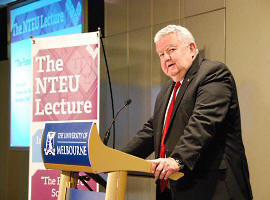|
News & Views item - October 2011 |
![]() Chief Scientist Delivers Inaugural National Tertiary Education
Union Lecture. (October 9, 2011)
Chief Scientist Delivers Inaugural National Tertiary Education
Union Lecture. (October 9, 2011)
 This
past Thursday Professor Ian Chubb, Australia's Chief Scientist and former
Vice-Chancellor of The Australian National University, delivered the inaugural
Lecture for the National Tertiary Education Union at The University of
Melbourne.
This
past Thursday Professor Ian Chubb, Australia's Chief Scientist and former
Vice-Chancellor of The Australian National University, delivered the inaugural
Lecture for the National Tertiary Education Union at The University of
Melbourne.
Professor Chub entitled his address
Science in Contemporary Australia![]() and much of it was an apologia for science, i.e. it is a very good
thing and those who unthinkingly attack science and scientists should be
admonished.
and much of it was an apologia for science, i.e. it is a very good
thing and those who unthinkingly attack science and scientists should be
admonished.
I don’t mean science like some people mean ‘free
speech’ – which is apparently a license to do and say whatever you want without
regard to facts, evidence or responsibility even if you have the privilege of an
audience. I do mean science with proper ethics controls, proper regulation when
regulation is proper and licensing when that is proper.
But instead of these, I chose to focus on something else tonight. I plan to
speak about:
• The value of science.
• The need for academics to contribute to public debate in their area of
expertise.
• The contribution of public institutions to the common good.
• And the importance of intellectual freedom.
He continued:
Matters which cut to the core of science and which form the very basis of
science and of an informed, progressive and enlightened society
are apparently under siege.
This is disappointing; not to say regressive.
Instead of moving on and discussing things that matter today, and will matter
tomorrow, we are caught up fighting a rear guard action against those who seek
to question and tear down the very ideals, the values, the principles and the
practices of science.
Make no mistake. Our future as a nation, our prosperity, our quality of life and the well being of the entire planet all depend on science.
As to specifics regarding what he and the Office of the Chief Scientist (OCS) were actively engaged in, there were a couple of hints:
By early next year we (OCS) expect to release a substantial report on the
state of Australian science - primarily viewed from the supply side – our
universities.
Much of the academic profile of our supply side (not all of it) is driven by
undergraduate study choices – since substantial money follows where the students
go, and what they choose to study. This is a country where freedom of choice is
allowed.
The Chief Scientist for Australia then asks rhetorically:
Don’t we need a more strategic approach that comprehends that some disciplines are important to Australia (and the world) but not presently popular with students in large numbers? I think we do – and I hope we can make suitable recommendations when we see how the story unfolds.
Which is followed by a new definition of ERA and a singling out of Australia's Agricultural and Veterinary Sciences for special mention rather than specific recommendations:
But some issues are beginning to emerge. If I use Agriculture to illustrate the point; and if we put some of the data from the Evaluation of Research Australia alongside enrolment data we get the following picture:
There are 25 institutions that submitted research work in Agricultural and
Veterinary Sciences; 13 of these have students at any level enrolled in
Agricultural Science coded degrees; 3 have students at the Bachelor, Bachelor
honours and PhD level (Uni Melb, Uni Queensland, and Uni Tas); 6 have both
Bachelor's and PhD students, but no honours students; 2 have Bachelor's students
only; 2 have PhD students only9. And the enrolled numbers of domestic students
are dropping.
To turn the illustration into a question, is this appropriate for a country that
is heavily dependent on our agricultural exports and our agricultural capability
not just for ourselves but for our role as a global citizen?
Finally there are a series of what might be called motherhood statements followed by a swipe at our political masters as well as a giddap for Australian academia:
We simply must do more to support our teachers and more for our students.
And we must also provide careers... how many [of our best and brightest] have to
delay getting a house or starting a family because of their job insecurity?
I realise that I am preaching to the choir when I say we need to be strong
advocates for our universities...
To quote... from AAAS "...we think it would be unfortunate if policymakers
became the arbiters of scientific information and circumvented the peer-review
process," I add parenthetically, substitute ‘entertainers’, ‘commentators’, or
indeed ‘non-expert scientists’ for policy-makers and the hat still fits well.
To quote Paul Nurse [President of the Royal Society]: “It is essential, in
public issues, to separate science from politics and ideology. Get the science
right first, then discuss the political implications. We scientists also need to
work harder at discussing the issues better and more fully in the public arena,
clearly identifying what we know and admitting what we don't know.”
Our universities have unquestionably served us well. They will continue to do so
– if we let them do what they are good at. In turn, they must earn the right
rather than presume the right.
...with science, the world has prospects. Without it….well, I don’t think that
is worth thinking about.
Whether or not Professor Chubb is any more influential than his immediate predecessor on governmental policy when it comes to support for science and scientific research remains to be seen.